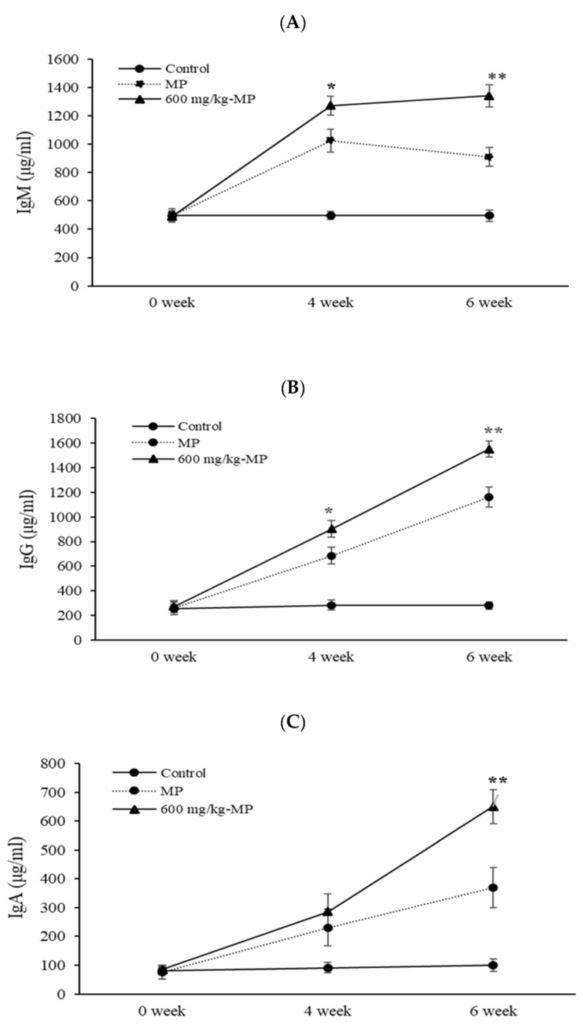Mycoplasma pneumoniae, a type of pneumonia, is frequently seen in healthy individuals; however, it is especially common in children and young adults. A long-lasting cough, a typical or slightly increased white blood cell count, the inability of penicillin and cephalosporin antibiotics to be effective, along with a positive result on a cold agglutination test are some symptoms that may be present.
Fucoidan, which is a fucose-containing sulfated polysaccharide found in brown algae, has shown multiple health benefits; in contrast to some other substances, it has been connected to antitumor, antiviral, anti-inflammatory, anticoagulant, and osteoblast differentiation-promoting activities.
This blog post will discuss the research conducted by Pai-An Hwang and colleagues, entitled “Dietary Supplementation with Low-Molecular-Weight Fucoidan Enhances Innate and Adaptive Immune Responses and Protects against Mycoplasma pneumoniae Antigen Stimulation”.
First, low molecular weight (LMW) fucoidan, which is rich in fucose and sulfate, was extracted and purified from edible brown algae (Laminaria japonica), and mice were orally administered LMW fucoidan for 6 weeks. Innate immunity acts as the primary defense system, responding to nearly all substances that endanger the body. In the study, the researchers examined the impact of orally delivered low molecular weight fucoidan, in doses of 200, 600, and 1000 mg/kg, on the innate immune response of mice without immune deficiencies.
The spleen is crucial for defending the host and is where innate and adaptive immune responses occur. First, we examined the spleen weight and splenocyte proliferation response of mice treated with low molecular weight fucoidan. For a period of six weeks, mice were given daily oral administrations of either 200, 600, or 1000 mg/kg of low molecular weight fucoidan, or distilled water which served as the control. Body weight increased steadily, with no statistically significant difference between treated and control mice. After harvesting, spleen cells were prepared and stimulated with concanavalin A (Con A), a T cell mitogen, or lipopolysaccharide (LPS), a B cell mitogen, for 72 hours. Mice that received 200, 600, and 1000 mg/kg of low molecular weight fucoidan had splenocytes that exhibited significantly increased proliferation when exposed to Con A and LPS stimulation, in comparison to the control mice. This suggests that the low molecular weight fucoidan was responsible for an increase in the proliferation of both T and B cells.
Natural killer (NK) cells, part of the innate immune system, are crucial for removing tumor cells in the initial phases. To investigate the effect of low molecular weight fucoidan in enhancing NK cell activity, we assessed whether low molecular weight fucoidan could induce cytotoxic NK cell activity against YAC-1 cells, which are sensitive to lysis by activated NK cells. The study’s results indicated that mice given low molecular weight fucoidan had increased NK cell activity compared to the control group.
The phagocytic activity of peritoneal cells taken from mice that had been given low molecular weight fucoidan was measured by the quantification of internalized fluorescein isothiocyanate (FITC)-Escherichia coli (E. coli). Cells isolated from mice that had received 1000 mg/kg low molecular weight fucoidan had significantly increased phagocytic activity. According to the results, fucoidan enhanced the ability of human blood to eliminate microorganisms through phagocytosis, thus improving the number and function of phagocytes. This shows that LMW fucoidan effectively stimulates innate immunity not only by phagocytosis but also by activating extracellular killing by NK cells (See Table 3) to destroy invading pathogens.
Following the presentation of the previous results, the research extended to include an investigation into the adjuvant effect that LMW fucoidan has on adaptive immune responses. LMW fucoidan was orally administered daily for 6 weeks, and mice were immunized with the protein ovalbumin (OVA) to examine its effect on cytokine responses and specific antibody production against OVA. The spleen weights of the mice were measured and the ratio of spleen weight to body weight was calculated. The ratios of OVA-immunized mice and OVA-immunized + LMW fucoidan-treated mice were higher than those of the control group (See Figure 1). However, the ratio did not change when only LMW fucoidan was consumed for 6 weeks.
Cytokines function as chemical messengers within the immune system and are primarily produced by T helper (Th) cells. They investigated the effect of LMW fucoidan on cytokine production, which mediates and controls adaptive immune responses. Th1 cytokines, including IL-2 and IFN-γ, and IL-4, a Th2 cytokine, were significantly increased after LMW fucoidan administration. The production of the Th2 cytokine IL-5 did not appear to be significantly different based on the observations. LMW fucoidan administration during OVA stimulation significantly reduced TNF-α, a multifunctional inflammatory cytokine. Although NK cell activity is enhanced by IL-2, IL-4, and IFN-γ, this study showed that IL-2, IL-4, IFN-γ production, and NK cell activity were increased in splenocytes from mice treated with orally ingested low molecular weight fucoidan. The Th1/Th2 concept suggests that modulating the relative contribution of Th1- or Th2-type cytokines is likely to regulate the development and strength of immune responses. The study results showed that both Th1 and Th2 responses were significantly increased after oral administration of low molecular weight fucoidan in OVA-challenged mice. Based on the collective data, it is reasonable to infer that the oral intake of low molecular weight fucoidan contributes to the maintenance of a beneficial equilibrium between Th1 and Th2 cell activities.
Immunoglobulins, also known as antibodies, protect us from pathogen infections and antigen sensitization. Immunoglobulin M (IgM) antibodies play a key role in the early stages of immune surveillance. Immunoglobulin A (IgA) is the major humoral factor of mucosal immunity, while IgE is an allergen-specific immunoglobulin that is stimulated by various allergens to produce corresponding IgE. The researchers examined how low-molecular-weight (LMW) fucoidan influenced the serum concentrations of anti-OVA IgG, anti-OVA IgA, and anti-OVA IgE, which play a crucial role in mediating adaptive immune responses. As expected, immunization with OVA significantly increased serum levels of anti-OVA IgG, anti-OVA IgA, and anti-OVA IgE compared with control mice. Anti-OVA IgG and anti-OVA IgA were significantly increased in the serum of mice administered low molecular weight fucoidan compared with mice immunized with OVA.
The creation of IL-2 and IL-4 yielded comparable outcomes, which then trigger B cells to become active and mature. These data suggest that low molecular weight fucoidan functions as an adjuvant to enhance antigen-specific immune responses. Furthermore, anti-OVA IgE was significantly reduced in these mice, suggesting that low molecular weight fucoidan may be useful in suppressing allergic reactions. Overall, low molecular weight fucoidan had a significant effect on cytokine expression by enhancing the production of IL-2, IL-4, and IFN-γ. Thus, low molecular weight fucoidan may promote Th1 differentiation and reduce IgE.
In order to find out if low molecular weight fucoidan has an early immunomodulatory effect that prevents infection and reduces illness in cases of M. pneumoniae infection, MP antigen was given twice. The first MP antigen inoculation was considered as primary infection with M. pneumoniae, and the second MP antigen inoculation was considered as reinfection. After MP antigen inoculation, the IgM, IgG, and IgA concentrations in the serum of the low molecular weight fucoidan group were higher than those of the control group. The levels of IgM and IgG in the serum rose considerably following the first and second inoculations, in contrast to the mice in the MP antigen group. There was no significant difference in IgA levels after MP antigen inoculation with or without low-molecular-weight fucoidan. (See Figure 2)
The data suggests that low molecular weight fucoidan could potentially offer assistance through promoting antibody production in the context of reinfection by M. pneumoniae. Simultaneously, low molecular weight fucoidan was found to augment spleen cell proliferation, NK cell activity, phagocytic activity, and the generation of IL-2, IL-4, and IFN-γ. In addition, mice stimulated with OVA and MP antigens showed an increase in antigen-specific antibody production when treated with low-molecular-weight fucoidan. Low molecular weight fucoidan taken as a natural food supplement may enhance immune responses and reduce the effects of M. pneumoniae infection.


Source: Mar Drugs. 2019 Mar 18;17(3):175. doi: 10.3390/md17030175
